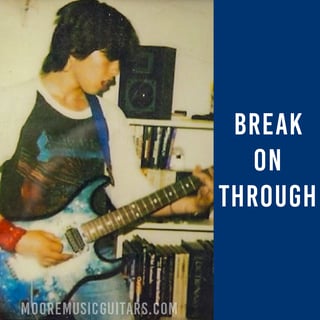
Like many guitar players, I began as a kid and started to get serious about it during my teenage years. Those years were the beginning of a journey when many of us search for answers to the questions about who we are, who we will become, and what I call “The Big Why?” For me and others, the period of existential angst characteristic of adolescence was anchored by a dedication to learning to play the guitar. I had a release valve for the stresses and tensions that were new to me then, and are part of the challenges of being an adult.
Then “adult life” happens. Typically when we get to the early 20’s, when the quarter-life crisis asserts itself and the demands of early-adulthood dictate harsher terms regarding the use of time and money. How do you continue to follow your passion and your dreams? Is it even a realistic expectation that we have the option to do so? When do the calls to grow up fairly, or unfairly, determine your life’s path? Do you follow the well-intended advice of others or continue to march to the beat of your own drum?
The ability to self-motivate is an important lesson that obviously applies to life in general. For guitar players who want to progress to the point that they’re making music with others, it’s essential. Here’s the thing: success is measured in more than one way. If a goal in life is happiness, then the way success is measured in terms of personal, professional, and artistic achievement has to be reflected upon daily. This daily reflection is crucial because we are confronted with a manufactured definition of success, one that is the product of concerted efforts to make us value things rather than experiences every single day. The path of least resistance does not lie swimming upstream against the current of pop-culture material consumerism.
In our early 20’s we’re caught between the realities of personal survival and the push to achieve an image of success and beauty that we’ve been inundated with since childhood. This awareness and the inclination to work against it, to the consternation of others, is one of the things that distinguishes you, the “sensitive artist-type,” from everyone else. If you’re still pursuing your craft, guitar or otherwise, during this period in life, that’s you, my friend, already a veteran of digging deep, bouncing back, and blazing trails.
Is there a trick to making it through this, or other tumultuous times in life? The short answer is, no. The process of defining ourselves involves all of our interests. It’s an ongoing part of life; the pursuit of our craft is an intrinsic part of developing what sociologists call our primary identity.
When I was in my 20’s, it helped to know that I was not alone, a member of a cohort with shared values and aspirations. This camaraderie is the support base that everyone needs and relies upon to greater or lesser degrees. Hopefully you come to the realization that you get what you give and, give what you get with the understanding that a rising tide lifts all boats. The attitude and ethos developed when you feel like you can live forever, and 30 years old seems far away, can be a time when the foundation for personal and artistic growth is laid. The character forged by persevering and recognizing value in places others overlook is what helps to break on through to the other side of the quarter-century crisis. After 30 comes and goes, the earlier grit and determination bring unforeseeable benefits that manifest later in life.
No one tells you that it’s harder to make friends when you get older! You may get lucky and befriend some of your kid’s friend’s parents but family and the work/life balancing act leave little room to create new relationships, much less nurture old ones. The unforeseeable benefit of playing guitar all my life lies in that I’m enriched not only by the pursuit of the craft but the relationships that result in the collaborative process of playing with different groups of musicians. With different groups come different crowds that follow them, different venues to perform in and new avenues of inspiration. I know this isn’t the case for all, but most artists who’ve dedicated significant portions to their life to their craft are humbled by their pursuit: if you haven’t learned the lesson of humility, you’re not doing it right.
The same thing that sustains you in the early 20’s and helps you break on through to the other side of the quarter-life crisis is the knowledge that once you’ve met someone and find they play the guitar or are trying, they’re no longer a stranger. Whatever your means of expression, the honing of your craft and the understanding that the master is also a student is the fundamental difference between knowledge and wisdom. The value we place on experiences, friendship and camaraderie rather than things is what sustains us and helps give meaning to the music, art and lives we live. There is no trick to it.
